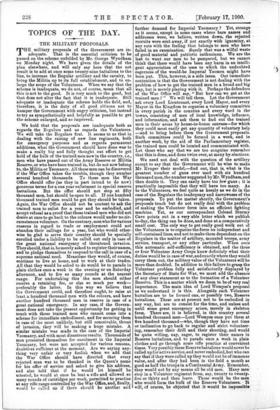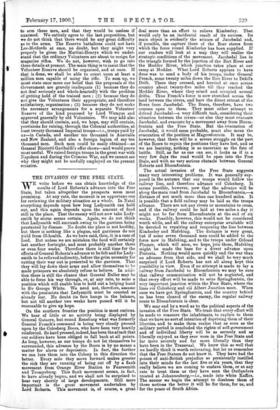TOPICS OF THE DAY.
THE MILITARY PROPOSALS.
We hold that the proposals are inadequate both as regards the Regulars and as regards the Volunteers. We will take the Regulars first. It seems to us that in dealing with the raising of new line regiments, both for emergency purposes and as regards permanent additions, what the Government should have done was to make a really big and fully thought out effort to get hold of the bulk of the trained men now in the country, i.e., men who have passed out of the Army Reserve or Militia Reserve, or who have been trained in, but do not now belong to, the Militia or Yeomanry. All these men can be discovered if the War Office takes the trouble, though they number several hundred thousands. To these men the War Office should offer (as they in part intend to do now) generous terms for a one year enlistment in special reserve battalions. But the offer should not stop at fifty thousand men, but should be open to all. If one hundred thousand trained men could be got they should be taken. Again, the War Office should not be content to ask the trained men to enlist for a year and be embodied, and accept refusal as a proof that those trained men who did not desire at once to go back to the colours would under no cir- cumstances volunteer. On the contrary, menwho for various reasons in regard to trade or employment could not abandon their callings for a year, but who would other- wise be glad to serve their country should be specially enrolled under a liability to be called out only in case of the great national emergency of threatened invasion. They should, that is, be merely asked to register their names, and to pledge themselves to respond to the call in case of a supreme national need. Meantime they would, of course, continue to live at home, and to work at their trades. All that they would be asked to do would be to parade in plain clothes once a week in the evening or on Saturday afternoon, and to fire so many rounds at the nearest range. For undertaking this the men should either receive a retaining fee, or else so much per week— preferably the latter. In this way we believe that the Government could, and therefore ought, to raise at least a hundred thousand men with the colours, and have another hundred thousand men in reserve in case of a great national emergency. In any case, if the Govern- ment does not take the present opportunity for getting in touch with those trained men who cannot come into a scheme for immediate embodiment, and for securing them in case of the most unlikely, but still conceivable, threat of invasion, they will be making a huge mistake. A similar mistake was made in the case of the Imperial Yeomanry, and with most disastrous results. Thousands of men presented themselves for enrolment in the Imperial Yeomanry, but were not accepted for various reasons, doubtless sufficient at the moment. Are we saying any- thing very unfair or very foolish when we add that the War Office should have directed that every rejected man was to be thanked in the Queen's name for his offer of service and asked to give his address, and also told that if he would let himself be attested, he would at once be lent a rifle and allowed so many rounds of cartridges per week, permitted to practise at any rifle range controlled by the War Office, and, finally, would be called up if there should be another and further demand for Imperial Yeomanry ? Yet, strange as it seems, except in some cases where bare names and addresses were, we believe, written down, the rejected recruits were sent away, if not exactly with ignominy, at any rate with the feeling that belongs to men who have failed in an examination. Surely that was a wilful waste of good material and patriotic enthusiasm. We are the last to want our men to be pampered, but we cannot think that there would have been any harm in an intelli- gent appreciation of the uses to which the undoubted eagerness of the would-be Imperial Yeomen might have been put. This, however, is a side issue. Our immediate contention is that the Government is not dealing with the problem of how to get the trained men in a broad and big way, but is merely playing with it. Perhaps the defenders of the War Office will say, " But how can we get at the trained men ? " We will tell them. Let the Government ask every Lord Lieutenant, every Lord Mayor, and every Mayor in the Kingdom to organise a voluntary committee in every parish in the counties and every ward in the towns, consisting of men of local knowledge, influence, and information, and ask them to find out the trained men in their areas by house-to-house canvass—for which they could most easily get any quantity of voluntary help —and to bring before them the Government proposals. Such committees could be formed in a week, and in another week, by the aid of the Parliamentary register, the trained men could be located and communicated with. Let those who say that we are too sanguine remember that this is done, and done twice over, at many by-elections.
We need not deal with the question of the artillery except to say that the Government will be wise to make Mr. Kruger their model,—find out, that is, what is the greatest number of guns ever used with six hundred thousand men, the number suggested by Mr. Wyndham, and then double it. They can easily have too few guns ; it is practically impossible that they will have too many. As to the Volunteers, we feel quite as keenly as we do in the case of the Regulars the inadequacy and narrowness of the proposals. To put the matter shortly, the Government's proposals touch but do not really deal with the problem of making the Volunteer force into an efficient fighting machine. Yet, as our correspondent Colonel Sturmy Cave points out in a very able letter which we publish to-day, the thing can be done, and done at a comparatively small cost. The only way to get really good work out of the Volunteers is to organise the force on independent and self-contained lines, and not to make them dependent on the Regulars in the matter of artillery, mounted troops, army service, transport, or any other particular. When once this automatic self-sufficiency is obtained, and the three or four Volunteer Army Corps know definitely what their duties would be in case of war, andexactly where they would carry them out, the military value of the Volunteers will be more than doubled. In addition to this failure to grasp the Volunteer problem fully and satisfactorily displayed by the Secretary of State for War, we must add the absence of any clear statement as to the formation of a Volunteer Reserve. This is a matter which we deem to be of very real importance. The main idea of Lord Wemyss's proposal as we understand it is this. Alongside each Volunteer battalion are to be formed one, or possibly two, Reserve battalions. These are at present not to be embodied in any way, but are to consist for the time, and unless and until some great emergency arises, merely in skeleton form. There are, it is believed, in this country several hundred thousand men—Lord Wemyss once put them at five hundred thousand—who, though they have not time or inclination to go back to regular and strict volunteer- ing, remember their drill and their shooting, and would be quite willing, nay, eager, to register their names in Reserve battalions, and to parade once a week in plain clothes and go through some rifle practice at convenient times. Very possibly these Reserve battalions would never be called up for active service, and never embodied,but who can say that if they were called up they would not be of immense value, and after they had been in the field a month as good as half the troops in a Continental Army. Remember, they would not by any means all be old men. Many men' stop in a Volunteer regiment from, say, twenty to twenty- five or thirty and then leave. These would be the men who would form the bulk of the Reserve Volunteers. It will, of course, be objected that it would be impossible to arm these men, and that they would be useless if unarmed. We entirely agree to the last proposition, but we do not think that there would be any great difficulty as to the arms. The Reserve battalions could not have Lee-Metfords at once, no doubt, but they might very properly be given the Martini-Henrys which we under- stand that the ordinary Volunteers are about to resign for magazine rifles. We do not, however, wish to go into these details at present. The main thing is to insist that the Volunteer Reserve should be organised, and at once. If that is done, we shall be able to count upon at least a million men capable of using the rifle. To sum up, we must state once more our belief that the proposals of the Government are gravely inadequate (1) because they do not deal seriously and whole-heartedly with the problem of getting hold of the trained men ; (2) because they do not give the Volunteers their appropriate, and therefore satisfactory, organisation ; (3) because they do not make the necessary arrangements for a separate Volunteer Reserve of the kind proposed by Lord Wemyss and approved generally by old Volunteers. We may add also that they should contain, and, we hope, may still contain, provisions for raising, through the Colonial authorities, at least twenty thousand Imperial troops—i.e., troops paid by us—in Canada, and another ten thousand in Australia and New Zealand, and also a foreign legion of say ten thousand men. Such men could be easily obtained—as General Ricciotti Garibaldi's offer shows—and would prove most useful. We raised foreign troops in the great war with Napoleon and during the Crimean War, and we cannot see why they might not be usefully employed on the present occasion.







































 Previous page
Previous page